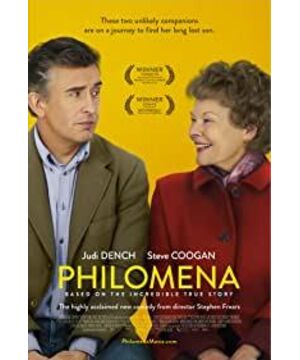At first glance, I thought it was an old-fashioned family search story. Not a sufficient reason to attract spectators. To be honest, the selling point of the film, whether it is the theme, actors or directors, is difficult to promote in the Hong Kong market, and the four Academy Award nominations are just better than nothing. But if this is the case and not interested, I am afraid that I will miss the film, which is really a pity. It's all because "A Thousand Miles Follow Me" is an excellent work. The director's control, the actors' superb and coordinated interpretations, the wide-ranging and thought-provoking themes, and the relaxed and orderly rhythm all make this "human feeling" story full of infection. The audience's mood also rose and fell slowly.
The story begins with religion. The Irish believe in Catholicism and believe that premarital sex is a heinous sin, and being an unmarried mother is even more sinful. Although I don't know if the male side has been forgiven, poor Philomena (Judi Dench) will be punished "for a lifetime" to atone for her sins. Young and ignorant Philomena (played by Sophie Kennedy Clark in the young version), ignorant of sexuality, becomes pregnant after a taste of the forbidden fruit. The family abandoned her, and the monastery, in the name of the gods, sentenced her to the punishment she deserved. Birth without anesthesia, life and death, if God wants to call you, you have to go. After passing this level, Philomena had to thank the monastery for taking in her, and she had to work hard day and night, spending only an hour with her children a day. As a result, the child was adopted, and Philomena was separated from the child for fifty years.
Don't blame me for spoilers, basically the above is just a premise, but it's already infuriating. The image of Catholicism in "A Thousand Miles Follow Me" is undoubtedly poor and reviled. Did Philomena blame God? No, she is still religious in her old age, she can only blame herself, and she is deeply convinced of her sins. But this secret buried for 50 years is no match for the thoughts of his son. Through his daughter, he meets Martin Sixsmith (Steve Coogan), a former journalist who lost his job due to a political scandal. Martin originally had no interest in these (to paraphrase his own words), "Human-interested stories for weak-minded, ignorant people", but due to the need for livelihood, Therefore, I report on the story of helping Philomena find her son.
In reality, Martin published the book "The Lost Child of Philomena Lee" in 2009 based on the data, and "A Thousand Miles with Me" is based on the book. Actor Steve Gorgan is also a screenwriter, and the script he co-wrote with Jeff Pope won the Venice Film Festival Best Screenplay Award, and of course an Academy Award nomination is a must. The plot cleverly strikes a fine balance between comedy and drama, with the comedy focusing on the interactions and dialogue between the two protagonists with different personalities. Judi Dench is recognized as a good actor, from Queen Elizabeth in ancient costumes (Shakespeare in Love/Write My Love, 1998) to Iron King's stylized boss M (Skyfall/New Iron King: Wisdom Breaks the Sky) Cheng, 2012), different types of characters are hand-to-hand. This time Philomena is a goofy naive character (Martin describes her as "A life time of romance novels, the Reader's Digest and the Daily Mail can do to the human brain"), but it's the little fun that Philomena can do So charming and cute. What is even more admirable is the stoicism that Judi Dench injects into the character. Philomena's consistent faith in faith is not foolishness, but perseverance after inner struggle and choice. She finally chose to forgive and give up hatred, so as to admonish Martin, who was full of dissatisfaction and hatred in his heart, not to be blinded by emotions. Martin, on the other hand, shows the cynicism of the modern man, speaks sarcastically, calls himself an atheist, and has a surprising chemistry with Philomena.
"A Thousand Miles with Me" can be regarded as a road movie. The protagonists hold opposite and conflicting values. After experiencing the people and things on the journey, the differences gradually blend in, and understanding and understanding emerge spontaneously. What I reflected on during this period was the existence of religion. If I simply thought that the film criticized a certain part of Catholicism for being pedantic, it would only be scratching the surface. Religion becomes the shackles of morality. Are the rules of religion established by God, or are they human? In the end, whoever executes the judgment and who executes the punishment is just a believer in wishful thinking? The latter part of the film involves a little homosexuality, but it doesn't cover much. It is of a dramatic nature and has no direct connection with religion. Stephen Fiaers handled the ending a little too hastily, tending to be plain, but it was done in one go, and the warmth was still there, leaving the audience to slowly reminisce about this "human" British sketch.
View more about Philomena reviews











